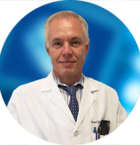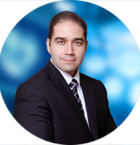CALL TODAY 646-846-1136 | EMAIL
Surgical Experts Dedicated to Improving Lives
At Lenox Hill Surgeons, our dedicated team of nyc surgeons and medical professionals provide compassionate care with the highest ethical & professional standards. In our state of the art facility, we offer surgical services using only the most cutting edge and current procedures and treatments.We specialize in general surgery, including extensive experience in performing hernia repair surgery. Our expertise is in minimally invasive surgery and robotic surgery. Minimally invasive and robotic surgery often allow patients to experience easier recovery than traditional open surgery. They also allow for more precise and less traumatic surgery. When robotic and minimally invasive surgery is not an option, we are also skilled and experienced in traditional open surgical procedures.
All of our doctors are experienced and skilled surgeons having undergone extensive training in school, residency and fellowships. They all practice medicine with ethical behavior, compassion and superb bedside manner. In the operating room they all exhibit precise mechanical abilities, analytical thinking and the ability to visualize tissue in three dimensions. These innate and learned skills allow our surgeons to be some of the most dexterous and skilled professionals in all of New York City and the Country.
Call us: 646-846-1136
About The Surgeons
PATIENT TESTIMONIALS
Recent Awards
We are honored and deeply appreciative to have consistently received prestigious awards and recognition year after year, establishing us as one of New York’s foremost hospitals for a wide range of general surgeries, safety measures, specialized procedures, and overall excellence in healthcare. At Lenox Hill Surgeons, our unwavering commitment lies in delivering exceptional care and unwavering support to our patients, guaranteeing their safety and successful recovery throughout their entire surgical experience.
Hospital Quality Awards
 America’s 50 Best Hospitals Award™ (2023, 2022)
America’s 50 Best Hospitals Award™ (2023, 2022)
Top 1% in the nation for providing the highest clinical quality year over year.

America’s 100 Best Hospitals Award™ (2021)
Top 2% in the nation for consistently delivering clinical quality year over year.

America’s 250 Best Hospitals Award™ (2023, 2022, 2021)
Top 5% in the nation for consistently delivering clinical quality.

Patient Safety Excellence Award™ (2023, 2022)
Top in the nation for providing excellence in patient safety by preventing infections, medical errors, and other preventable complications.
Specialty Clinical Quality Awards

America’s 100 Best Hospitals for Cardiac Care Award™ (2023, 2022, 2021, 2020, 2019)
Superior clinical outcomes in heart bypass surgery, coronary interventional procedures, heart attack treatment, heart failure treatment, and heart valve surgery.

America’s 100 Best Hospitals for Coronary Intervention Award™ (2023, 2022, 2021, 2020, 2019)
Superior clinical outcomes in coronary intervention procedures (angioplasty with stent).

America’s 100 Best Hospitals for Prostate Surgery Award™ (2023, 2022, 2021)
Superior clinical outcomes in prostate removal surgery and transurethral resection of the prostate.
Click to see all of our Healthgrades best doctors awards


Visit our main website at www.LenoxHillSurgeons.com
Blog Posts are Below:
Monthly Archives: March 2019
Liver Surgery – What to Expect
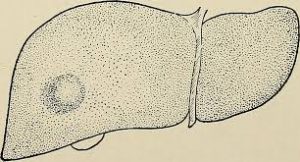 The little is one of the most important organs in the body, responsible for filtering blood and detoxifying. However, under certain circumstances, the liver or some suction thereof must be removed from the body. But what exactly does the liver do? Why would the liver need to be removed? And what should you expect from liver surgery and recovery?
The little is one of the most important organs in the body, responsible for filtering blood and detoxifying. However, under certain circumstances, the liver or some suction thereof must be removed from the body. But what exactly does the liver do? Why would the liver need to be removed? And what should you expect from liver surgery and recovery?
The Role of the Liver
The liver is located on the right side of the abdomen underneath the rib cage. The primary responsibility of the liver is blood filtration and chemical detoxification or absorption. Additional proteins and enzymes are also created in the liver. Drugs, including painkillers, some supplements, and alcohol are all processed by the liver. In addition, bile that is stored in the gallbladder is created by the liver. Bile is used in digestion and breaks down fats in order to allow them to be absorbed for use by the body.
When the Liver Must be Removed
There are many conditions that can seriously affect the effectiveness of the liver. Overexposure to chemicals or drugs can, over time, slow down and weaken the liver. Viral infections, such as hepatitis, can also seriously weaken the liver. One of the most common circumstances that require liver surgery is the presence of cancer. Anytime cancer is present within one section of the body, there is a threat of metastasis, or spreading of cancer. Gallstones can also lodge within the liver and cause obstruction, requiring surgical intervention. There are a few key considerations to be taken into account before liver surgery is suggested, though. Because the liver is so essential to many necessary functions, as much of the liver should stay in the body as possible. In addition, people with weakened immune systems may have difficulty recovering from surgery as demanding as liver surgery can be.
Surgery and Recovery
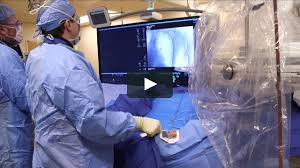 Before deciding that liver surgery is a necessity, a doctor will most likely want to perform a thorough medical examination and discuss your needs. For example, your doctor will likely want to know about your current medications, diet, and exercise regimen. Because of the critical nature of the liver, your doctor will want to be sure that this is the best course of action. Prior to the surgery, your surgeon will most likely advise you to avoid food and drink within the few hours before the surgery. During the surgery itself, we will make a small incision in the abdomen and remove as little of the liver as possible. One of the most important things to consider when selecting a surgeon is experience. We have first-hand experience with liver surgery and know exactly what to do.
Before deciding that liver surgery is a necessity, a doctor will most likely want to perform a thorough medical examination and discuss your needs. For example, your doctor will likely want to know about your current medications, diet, and exercise regimen. Because of the critical nature of the liver, your doctor will want to be sure that this is the best course of action. Prior to the surgery, your surgeon will most likely advise you to avoid food and drink within the few hours before the surgery. During the surgery itself, we will make a small incision in the abdomen and remove as little of the liver as possible. One of the most important things to consider when selecting a surgeon is experience. We have first-hand experience with liver surgery and know exactly what to do.
After the surgery has been completed, it is usually expected that the doctor will want to keep close supervision on your recovery. The average and expected recovery time in-house is only around a week, but it will take a few weeks until you feel the same. Some things, such as strenuous physical exercise and heavy lifting, should be avoided to limit the risk of incision site agitation. Your surgeon will likely give you specific recommendations about your diet and intake. After losing a section of the liver, your tolerance of medications, alcohol, and other drugs will change. It will be important to discuss your needs with your doctor and communicate regularly.
Does your liver need to be removed? Talk to the best surgeons in NYC for a consultation today.
For more information, visit our website: LenoxHillSurgeons.com
———
References:
https://www.mskcc.org/cancer-care/patient-education/about-your-liver-surgery
https://www.cancer.org/cancer/liver-cancer/treating/surgery.html
https://surgery.ucsf.edu/conditions–procedures/liver-resection.aspx
Dysphagia Surgery: Steps, Benefits, Side-Effects, Precautions & Prognosis
Dysphagia Surgery
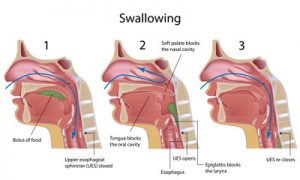 Some functional and anatomical abnormalities of the esophagus or the pharynx can cause dysphagia which is essentially a fancy medical term to indicate difficulty swallowing. This condition can be successfully treated by surgical procedures. Also, surgery is recommended when dysphagia is found to be associated with esophageal carcinoma, and compression of this organ due to other abnormalities or tumors in the chest. The surgical methods presently available are varied, and the choice of medical procedure is decided by the causative condition of dysphagia.
Some functional and anatomical abnormalities of the esophagus or the pharynx can cause dysphagia which is essentially a fancy medical term to indicate difficulty swallowing. This condition can be successfully treated by surgical procedures. Also, surgery is recommended when dysphagia is found to be associated with esophageal carcinoma, and compression of this organ due to other abnormalities or tumors in the chest. The surgical methods presently available are varied, and the choice of medical procedure is decided by the causative condition of dysphagia.
Steps
- The LES or lower esophageal sphincter is dilated in patients with achalasia. The doctor makes the patient swallow a tube having a balloon at its end. It is placed across the LES by means of an X-ray, and then the specialist blows the balloon all on a sudden. The objective is to stretch, rather tear, the sphincter. It can also be useful in treating Schatzki rings and strictures and other anatomical problems associated with
- In esophagomyotomy, the surgeon cuts the LES by making a large incision in the abdomen, or laparoscopically where small punctures are made in the chest or the abdomen of the patient.
Benefits
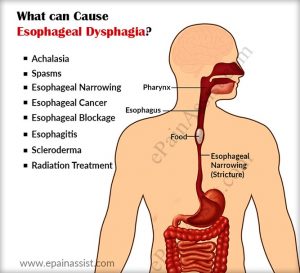 For patients with severe dysphagia disorders, it may be necessary to bypass the pharynx entirely and the oral cavity to provide them with enteral nutrition. Surgical alternatives range from IOC or intermittent oroesophageal catheterization to PEG or percutaneous endoscopic gastronomy. Surgery for chronic cases of aspiration may include the following procedures:
For patients with severe dysphagia disorders, it may be necessary to bypass the pharynx entirely and the oral cavity to provide them with enteral nutrition. Surgical alternatives range from IOC or intermittent oroesophageal catheterization to PEG or percutaneous endoscopic gastronomy. Surgery for chronic cases of aspiration may include the following procedures:
- Medialization: It restores subglottic pressure and glottis closure during the swallow.
- Laryngeal suspension: The larynx is made to be rest in a comparatively protected place under the tongue.
- Laryngeal closure: The medical practitioner may perform it to shut the glottis off, and thus, provide ample protection for the airway while sacrificing the quality of phonation.
- Laryngotracheal separation-diversion: It may be opted to separate the alimentary tract from the airway.
Complications
The most commonly occurring complications are bleeding and perforation of cricopharyngeus. Dysphagia is typically reported after undergoing an ACS surgery, i.e., surgery of the anterior cervical spine. Although risk factors associated with dysphagia are published in the journals, they remain controversial to date.
Precautions
- The healthcare professional may prescribe making an alteration in food/liquid texture, temperature, or consistency.
- It is vital to ingest slowly and take smaller bites.
- The caregiver should also strictly adhere to the promoting strategies to ensure increased safety.
- It is crucial for one to maintain an appropriate positioning at the time of eating, and the ideal manner is to consume any liquid or food while holding an upright position, and also the chink being tucked a little at a right angle.
- An individual should continue to maintain the upright position even after finishing one’s meal, and should not make any attempt to alter the present position for a minimum of forty-five minutes post-consumption of the meals.
- If a person is found to be diagnosed with GERD also, then the head of the patient’s bed should be inclined at an angle of forty-five degrees.
- The care provider should always remember not to give an aspiration patient anything to consume a few hours before the bedtime.
- One should use medications that are meant to promote stomach emptying and reduce the reflux.
Prognosis
It is rather impossible for anyone to predict the outlook or prognosis for dysphagia in general, as numerous medical conditions can be held responsible for the symptoms associated with it. The outlook is case-dependent and is decided by the underlying medical issue/s of a patient.
Conclusion
Although dysphagia can appear to be frightening, this condition is not always necessarily chronic. The family physician should be consulted as soon as one starts experiencing any swallowing difficulties or other GERD (Gastroesophageal reflux disease) symptoms. The latter can be effectively treated with prescription drugs to reduce the amount of stomach acid.
Get in touch with us at 212-988-1136 or schedule an appointment to get immediate care and treatment for the condition.
References


